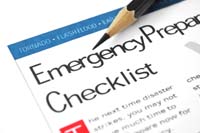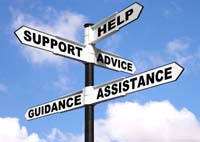What to do before, during and after a storm

Being prepared in case of a natural disaster can save lives, property and a lot of heartache. The planning that homeowners and business owners do can keep a natural disaster from becoming an insurance disaster. Following are some helpful tips to consider before, during and after a storm. The purpose of this information is to provide home and business owners of Delaware with information that can help them prepare for a possible disastrous situation.
Pre-Disaster Planning
Natural disaster planning is one of the most important duties a home or business owner can perform. Protection of life is first and foremost before, during and immediately following a disaster. It is very important that consumers take time out before a disaster strikes to be certain that insurance concerns have been addressed. The following is a list of insurance-related coverage suggestions that consumers should consider before they are faced with a disaster.
Create a Home Inventory
Prepare for severe weather disasters by creating a home inventory. Before a disaster occurs, take photographs or make a video of each room of your home or business and compile a set of records, old receipts, and bills – to help establish the price and age of your property. Write down brand names and model numbers of appliances and electronic equipment and date purchased. Do not forget to list items such as clothing, sports equipment, tools, china, linens, holiday decorations, business equipment, hobby materials, and all other materials associated with your home or business.
The National Association of Insurance Commissioners (NAIC) offers free resources to the insurance consumer. Feel free to visit their website Homeowners and renters: It pays to know your stuff for home inventory checklist mobile apps for the iPhone and Android.
No iPhone or Android? Download the Delaware Insurance Department’s printable home inventory form. You can also watch our videos on the benefits of taking the time to do your Home Inventory NOW and the importance of having a home inventory.
Pre-Disaster Activities
- Monitor the latest weather developments by following radio or television broadcasts and be prepared to evacuate.
- Make sure that you understand the deductible provision of your policy.
- Keep all of your insurance policies in an easily accessible location.
- If forced to evacuate, keep with you at all times your insurance records, including the name and telephone number of your insurer or insurance agent.
- Be certain you understand the claim procedures of your insurance company.
- Make sure you have insurance up to at least 80% of the value on your home to avoid penalties under any co-insurance provision of your policy.
- Keep all necessary information regarding your health coverage, including prescription information, with your insurance records in the event of an evacuation.
- Be prepared to board up your windows and doorways to protect your home or business. Pre-cut plywood or other material can be used.
- Have a suitcase packed to last each member of your family for at least two days in case you need to evacuate from your home.
- In the event of a hurricane or flood watch, be sure that your vehicle has sufficient fuel in it in order to relocate to a safe area.
- Keep available a tarp and other supplies to protect your home in case it is damaged. The policy requires the policyholder to protect the property from further damage.
Flood Insurance
Contact your insurance company or agent and verify coverages are in place before a disaster strikes. Make sure you have wind coverage protection and flood insurance if your home or business is located in a flood plain area. The following resources can help you to:
- Determine Your Flood Risk – The National Flood Insurance Program (NFIP) website provides information for consumer and business property owners on flooding and flood risks. They also provide a “One-Step Flood Risk Profile” which will help rate your risk, estimate your premiums and find an agent. The NFIP offers flood insurance to homeowners, renters and business owners if their community participates in the program. Find out more about the NFIP Partnership.
- Reduce the Risk of Severe Flood Damage – The Insurance Institute for Business & Home Safety website provides information to protect against flooding and steps to take to reduce the risk of severe damage.
- Ready: Prepare. Plan. Stay Informed – The Federal Emergency Management Agency(FEMA) provides information on how to prepare for and make a plan of action in the event of a hurricane.
- American Red Cross Delmarva – provides relief to those affected by disasters and empowers individuals in our community to prevent, prepare for, and respond to emergencies.
Prepare a “Family Disaster” Plan
- Meet with family members to discuss the dangers of fire, severe weather, flash floods, and other emergencies.
- Find the safe spots in your home and escape routes.
- Discuss what to do in the case of a power outage or personal injury.
- Know how to turn off water, gas and electricity at the main switches.
- Keep family records in a water and fire-proof container.
- Post emergency phone numbers near telephones.
Prepare a Disaster Supply Kit
- Assemble the supplies you might need in case of an evacuation, in easy-to-carry containers (such as a backpack or duffle bag).
- Supplies can include:
- A supply of water (one gallon per person, per day).
- A supply of non-perishable packaged or canned food (and a non-electric can opener).
- Change of clothing, rain gear, and sturdy shoes.
- Blankets or sleeping bags.
- First aid kit and prescription medications.
- Batteries, flashlight, radio.
- Cash or credit cards.
Protecting Your Home or Business from Damage
Consumers can do a number of things to reduce the cost of their property insurance. Protecting their property from possible damage before a disaster can have a major impact on insurers’ willingness to continue insuring the property and can also have an impact on future prices the consumer will have to pay in the event his home or business is met by a disaster. By performing some of the following duties, consumers can make major contributions toward reducing the amount of losses occurring to their home:
- Consider adding storm shutters to the windows and doors of your home or business.
- Glue or nail down any loose shingles.
- Make certain yard items are tied down or secured. Bicycles, grills, toys, unsecured benches and any other items not tied down should be placed inside an enclosed building. These items become missiles during a tornado or hurricane.
- If you own a vehicle, do not park it under a tree if a storm is anticipated.
- Take precaution to remove any tree that has the potential of damaging your home or business during a storm.
Time to Evacuate
- Take copies of important paperwork, including your insurance policy and contact information for your insurance company, with you.
- Bring phone numbers for family members with you.
- Don’t forget to keep your family’s safety in mind. Your own home is child proofed, but a shelter, motel or friend’s house inland may not be.
- Be sure you and your family know where the exits are and how to escape in case of a fire.
- Make sure the building you stay in has working smoke alarms.
- Make sure any medicines and dangerous chemicals are out of reach.
- Bring along electric socket and outlet covers.
- Tie up mini-blind cords so they are out of your child’s reach.
- Check carpets for buried dangers like pins or coins.
- Check dresser drawers and bedside tables for hazardous items.
- Be alert for any lamps or televisions that could be tipped over by a small child.
- Beware of glass items in the kitchen and bathrooms.
- Keep wastebaskets covered or out of reach.
- Make sure decks or balconies have secure railings.
- Take along a safety gate to keep small children away from stairs or areas that may be dangerous
After the Storm

Protection of life is first and foremost before, during and immediately following a disaster. When re-entry has been cleared by authorities, BE CAREFUL to look for hazards such as downed power lines, broken glass, gas leaks, holes, etc.
Notify Your Agent of Your Loss
- You must provide as much detail as possible about damage to your property.
- Remember to give all work and home telephone numbers where you may be reached. This is especially important if your home is uninhabitable. Your insurance company will need to be able to contact you.
- People whose homes are not livable or whose business has been disrupted due to severe structural damage will be given first priority in having their claims handled. Those homes or businesses with less severe structural damage will be given second priority, while those with minor damage will be next, and so on.
Temporary Repairs
If you incur losses following a storm, you may need to immediately make temporary repairs to your residence or business:
- If you need emergency money to help you make temporary repairs, you should contact your insurance agent or company.
- Remember to keep all bills and receipts.
- Do not contract for repairs, other than temporary repairs, prior to agreement with the claim adjuster or agent.
- Do not be rushed into signing repair contracts. It is best to deal with local, reputable contractors. Check each contractor’s credentials with your agent or claim adjuster, Chamber of Commerce, and the Better Business Bureau. The Attorney General’s Office, Department of Consumer Affairs, can also be contacted at 1-302-577-8600. Discuss payment terms before you sign any contract.
How to Protect Your Home or Business and its Contents
- First, find out the insurance company’s preference for temporary repairs.
- Board up windows and holes in the walls or roof and either cover furnishings or store them elsewhere.
- Plywood and heavy-duty plastic, available from lumberyards and building supply firms, are useful in making temporary repairs.
- If there is a lot of water in your home or business, try to get it out and leave the home or business well ventilated to allow for drying. Slightly raise your windows and crack your doors.
- Clean and dry furniture, bedding, rugs and carpet as soon as possible.
- To prevent rust on metal objects (such as appliances and drapery rods), first dry, then rub or spray with oil.
- Dry, but don’t oil, radios, TV sets and other electrical equipment. If it is electrical and has been exposed to water, have it professionally serviced before you use it.
- Remove small valuables (such as jewelry and silverware) to a safe place.
Know Your Adjuster
You must keep a record of the adjuster handling your claim. Get a name, telephone number, social security number, driver’s license number and the company represented. If you have any questions or problems regarding the handling of your claim, contact the company. However, if additional assistance is needed, then contact the Consumer Services Division, Delaware Insurance Department, at 1-800-282-8611 in Delaware or (302) 674-7310.
Prepare for the Adjuster Visit
- Personal Property
The claim process may begin in one of two ways. Your insurance company may send you a claim form, known as a “proof of loss form,” to complete. Or an adjuster may visit your home or business, before you are asked to fill out any forms. (An adjuster is a person authorized by the State and who is professionally trained to assess the damage.) In either case, the more information you have about your damaged possessions – a description of the item, date of purchase and what it would cost to replace or repair – the faster your claim generally can be settled.
- Make A List Of The Damaged Items
If possible, take photographs of the damage, and put together a set of records – old receipts, bills and photographs – to help establish the price and age of everything that needs to be replaced or repaired. Write down brand names and model numbers of appliances and electronic equipment. Do not forget to list items such as clothing, sports equipment, tools, china and linens, outside furniture, holiday decorations, business equipment and hobby materials. Do not throw out damaged furniture and other expensive items as the adjuster will want to see them.
If your property was destroyed or you no longer have any records, you will have to work from memory. Try to picture the contents of every room and then write a description of what was there. Try also to remember where and when you bought each piece and about how much you paid. It may also speed up the settlement of your claim if you find out how much it will cost to replace the destroyed items.
- Building Damage
Identify the structural damage to your home and other buildings on your premises, like a garage, tool shed or in-ground swimming pool. Make a list of everything you would like to show the adjuster when he or she arrives – for example, cracks in the walls, damage to the floor or ceiling and missing roof tiles. If structural damage is likely even though you can’t see any signs of it, discuss this with your adjuster. In some cases, the adjuster may recommend hiring a licensed engineer or architect to inspect the property. You should also get the electrical system checked. Most insurance companies pay for such inspections.
If possible, get written bids from reliable, licensed contractors on the repair work. The bids should include details of the materials to be used and prices on a line-by-line basis. This makes adjusting the claim faster and simpler.
Give yourself several days before the adjuster arrives to complete your list. It will take time to assess the damage. Although you can always notify the adjuster of any additional items you overlooked, this may delay the settlement of your claim. Be sure to keep copies of the list and other documents you submit to your insurance company. Also keep copies of whatever paperwork your insurance company gives you.
For more information on who to call or what to do in the event of a disaster, see our Property Damage Concerns page.







